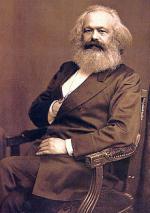Disable ads!
Karl Marx
Part of a series on Socialism Development History of socialism Socialist calculation debate Socialist economics Ideas Calculation in kind Cooperative Common ownership Economic planning Equal opportunity Free association Input-output planning Labour voucher Material balancing Peer-to-peer economy Production for use Public ownership Self-management Social dividend Socialism and LGBT rights Socialization To each according to his contribution Workplace democracy Models Decentralized planning Participatory economics Market socialism Lange model Mutualism Economic democracy Planned economy Soviet-type Project Cybersyn Socialist market economy Socialist-oriented market Variants Agrarian Anarchist Authoritarian Democratic Ethical Ecological Guild Impossibilism Liberal Libertarian Market Marxian One country Owenism Reformism Religious Revisionism Revolutionary Ricardian Scientific Social democracy State Syndicalism Utopian Zionist 21st-century History by country Brazil Canada France India Netherlands New Zealand Pakistan United Kingdom United States People Charles Hall François-Noël Babeuf Henri de Saint-Simon Robert Owen Charles Fourier Louis Auguste Blanqui William Thompson Thomas Hodgskin Pierre Joseph Proudhon Louis Blanc Moses Hess Karl Marx Friedrich Engels Mikhail Bakunin Ferdinand Lassalle William Morris Peter Kropotkin Edward Carpenter Mary Harris Jones Georgi Plekhanov Fernand Pelloutier Eugene V. Debs Ben Tillett John Dewey G. D. H. Cole Eduard Bernstein Antonio Gramsci Luis Emilio Recabarren Sidney Hook Leon Trotsky Rosa Luxemburg José Carlos Mariátegui Enrico Barone Fred M. Taylor Errico Malatesta Anton Pannekoek Farabundo Martí Oskar R. Lange Abba P. Lerner Léon Blum Mao Tse Tung Edvard Kardelj Farabundo Martí Clement Attlee Josip Broz Tito Einar Gerhardsen Olof Palme Fidel Castro Ho Chi Minh Ernesto Guevara Salvador Allende Deng Xiaoping Mikhail Gorbachev Hugo Chávez Evo Morales Organizations First International (International Workingmen's Assoc) Second International Third International (Comintern) Fourth International Fifth International Socialist International World Federation of Democratic Youth International Union of Socialist Youth World Socialist Movement International Committee of the Fourth International Socialism portal Economics portal Politics portal v t e Karl Marx[note 1] (/mɑrks/; German pronunciation: [ˈkaɐ l ˈmaɐ ks]; 5 May 1818 – 14 March 1883) was a German philosopher, economist, sociologist, journalist, and revolutionary socialist. Marx's work in economics laid the basis for much of the current understanding of labour and its relation to capital, and subsequent economic thought. He is one of the founders of sociology and social science. He published numerous books during his lifetime, the most notable being The Communist Manifesto (1848) and Das Kapital (1867–1894). Born into a wealthy middle-class family in Trier in the Prussian Rhineland, Marx studied at the Universities of Bonn and Berlin where he became interested in the philosophical ideas of the Young Hegelians. After his studies he wrote for a radical newspaper in Cologne and began to work out the theory of the materialist conception of history. He moved to Paris in 1843, where he began writing for other radical newspapers and met Friedrich Engels, who would become his lifelong friend and collaborator. In 1849 he was exiled and moved to London together with his wife and children, where he continued writing and formulating his theories about social and economic activity. He also campaigned for socialism and became a significant figure in the International Workingmen's Association. Marx's theories about society, economics and politics—the collective understanding of which is known as Marxism—hold that human societies progress through class struggle: a conflict between an ownership class that controls production and a dispossessed labouring class that provides the labour for production. States, Marx believed, were run on behalf of the ruling class and in their interest while representing it as the common interest of all; and he predicted that, like previous socioeconomic systems, capitalism produced internal tensions which would lead to its self-destruction and replacement by a new system: socialism. He argued that class antagonisms under capitalism between the bourgeoisie and proletariat would eventuate in the working class' conquest of political power and eventually establish a classless society, communism, a society governed by a free association of producers. Marx actively fought for its implementation, arguing that the working class should carry out organised revolutionary action to topple capitalism and bring about socio-economic change. Marx has been described as one of the most influential figures in human history. Many intellectuals, labour unions and political parties worldwide have been influenced by Marx's ideas, with many variations on his groundwork.
 Read more on wikipedia.org Read more on wikipedia.org
 All quotes by Karl Marx All quotes by Karl Marx
 Edit Edit
|

|
|
|
|
|
Background photo by Giuliana
|